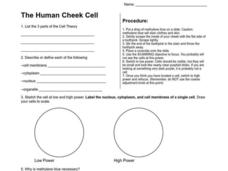Curated OER
The Human Cheek Cell
In this human cells worksheet, 7th graders complete a science experiment using human cheek cells. Students sketch the cells at high and lower power and label the cell nucleus, cytoplasm, and cell membrane.
Curated OER
The Joy of a Garden-Earth Day
Students explore the purpose of a garden. In this Earth Day lesson plan, students read the story The Gardener and complete a Venn diagram comparing life in a city to farm life. Students discuss Earth Day and plant flowers in a garden .
Curated OER
Fruit Flowers
Make a fun and healthy snack to celebrate Earth Day! Included are the directions for making a flower out of strawberries, kiwi, mint leaves, and raspberry licorice. Just provide your class with the materials and watch them make edible...
Curated OER
All About Plants
Young scholars identify plant needs. In this biology lesson, students watch All About Plants and then write a paragraph describing the various details about plants.
Curated OER
Apple: Seed to Tree
Students grow seeds of an apple and learn about Johnny Appleseed. In this apples lesson plan, students map Johnny Appleseed's travels, learn how he got his name, compare different Johnny Appleseed books, and grow apple seeds themselves.
Curated OER
Plants
First graders learn the basic needs of plants, label the major parts of a plant and name their uses. They also use a KWL chart.
Curated OER
Earth Epochs
Students explore earth epochs, i.e, Permian, Precambrian, Cambrian, Ordivician and through pictures they see what life on Earth and animals looked like. They organize Earth Epochs according to years going from greatest to least...
Curated OER
Plants
Students identify and label parts of a plant. They will construct a plant from art material and describe the purpose of each part for the plants survival. Students author a book with pictures and words or a story about a plant.
Curated OER
Plants
Second graders examine the characteristics of plants. As a class, they brainstorm a list of items plants need in order to survive. In groups, they complete various experiments in which they discover the functions of the parts of the plant.
Curated OER
Land Use Issues
Students discover seeds are a source of life. They also label the parts of a seed and examine the conditions which are needed for the seed to start growing. They follow the life cycle of seeds.
Curated OER
Life Cycles of Plants
Students discover the general life cycle of a plant, the parts of a plant, and what it needs to grow. They plant bean seeds and discuss the parts of a plant and what it needs to grow.
Curated OER
Light Microscopes
Seventh graders study the parts of a light microscope, and its proper use. They identify each part and explain why it is important to know how to use this tool. They practice observing newsprint on a wet mount slide.
Curated OER
Dried Vs. Soaked Beans
Students observe the differences between a dry and soaked bean, and identify the functions and parts of a bean at the beginning of its growth.
Curated OER
Meadows Observations
Students investigate and examine the different living things they find in a meadow. Students record the different colors that are present and create a graph, identify and label parts of a plant, use a magnifying lens to examine all ...
Curated OER
Violets, Daffodils, Roses and Thorn
Fourth graders complete a variety of exercises and activities surrounding the scientific and artistic properties of the parts and processes of a plant/flower.
Curated OER
A Seed Grows
Second graders begin the instructional activity by planting their own bean seed. Individually, they make predictions about how many leaves and roots their plant might grow and each day record their observations. They graph the results of...
Curated OER
Soil Composition
Students investigate how soil composition affects plant growth. In small groups, they plant various seeds in different soil mixtures, record plant and seed growth, and analyze the results.
Curated OER
Creating the Water Cycle
Students create a terrarium to examine the stages of the water cycle. In small groups, they plant and water a seed in an enclosed plastic container. Each day they diagram and write observations of the terrarium using water cycle vocabulary.
Curated OER
Understanding Our Planet's Food Web
Sixth graders, in groups, examine how humans have a tenuous position as part of an ecosystem.
Curated OER
Create a Habitat for an Animal
In this marine life instructional activity, students label the ocean animal and each part of its habitat. Students then draw one of the habitats including the animals and plants that live there.
Curated OER
What Do Plants Need to Grow?
Students in an ESL classroom identify the necessary requirements plants need to grow. Using Spanish worksheets, they label each part of a plant and state their function. They are given cutouts of a picture and the Spanish word in which...
Curated OER
Seeing Cells
Sixth graders study living cells and their functioning units. In this cell instructional activity students color cell diagrams, answer questions and discuss the differences between plant and animal cells.
Curated OER
The Making of Steel
Students begin to explain the process, and gain an appreciation, of the enormity of a steel facility and the influence it had on the building of the city to run the steel plant. They access websites imbedded in this plan to view the...
Curated OER
Wheat: Ancient and Ageless
Students label the parts of a wheat plant on a worksheet. In this Egyptian farming lesson plan, students thresh a wheat stem and estimate the amount harvested. Students research Ancient Egypt online.























